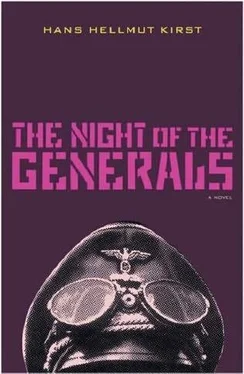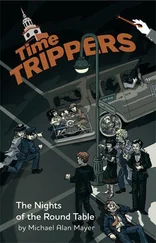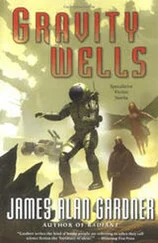“A splendid choir,” declared von Seydlitz-Gabler.
Kahlenberge nodded. “Practice makes perfect.”
The G.O.C. cleared his throat. “We Germans have an inexhaustible repertoire of choral music. I’m particularly fond ofLützows wilde, verwegene Jagd.”
“We’ll practise it,” Kahlenberge assured him. His curiosity mounted.
“Choral singing is an embodiment of the purest German traditions. It’s not surprising that all our most characteristic virtues can be found in it—profound romanticism, for instance, and boundless love of nature, especially the German forests. Unquestioning loyalty, too.”
Kahlenberge smiled. Digressions of this sort meant that something quite extraordinary was in the offing, but the G.O.C. was finding it patently difficult to steer the conversation round to it. “Let’s go into the inner courtyard,” said von Seydlitz-Gabler eventually.
The inner courtyard boasted a fountain, a stretch of lawn and some comparatively unobjectionable early baroque cloisters. Here the G.O.C. liked to pace up and down in peace and seclusion, lost in thought processes which he deemed creative, and here, once he and Kahlenberge were safely within its precincts, he turned on his Chief of Staff with the air of a man about to impart a revelation. “Imagine it, Kahlenberge! That man Grau is sitting in my outer office!”
“Not for the first time, sir, surely?” inquired Kahlenberge drily.
“No, no, but he’s sent a message asking permission to put some questions to me—in an official capacity! What do you think of that?”
Kahlenberge could not find the right words at first—he was so surprised and delighted. With relish, he mentally reconstructed the sequence of events. Grau had turned up in the outer office and announced that he proposed to ask the G.O.C. some official questions—and the G.O.C. had promptly raced out of the back door and gone to find his Chief of Staff. “What a remarkable thing,” he commented ambiguously.
“Something must be done—and quickly!”
“But why, sir?” Kahlenberge’s tone was innocent.
“Now see here, my dear chap!” The G.O.C. drew himself up imperiously as though inspecting a whole division on the eve of battle. “This is an alarming state of affairs. We must map out a course of action at once. We can’t just lie down and let the Abwehr ride rough-shod over us.”
“Has Grau given any hint as to what questions he intends asking?”
“Oh, that’s clear as daylight. The man’s obviously trying to provoke me. Yesterday I thought he was just having his little joke, and since it was a joke in doubtful taste I treated it as such. In my innocence, I thought he would come to his senses if he were given a chance to do so—but what happens? He has the effrontery to waltz in here and try to ask me questions—me!”
“And you really think it has something to do with the story he told us yesterday? May I ask what makes you so sure?”
“My instinct tells me—instinct coupled with experience. Believe you me, Kahlenberge, this man Grau wouldn’t shrink from following up the most preposterous red herrings. He’s the sort who’d send his own mother to the gallows if it helped him to wrap up a case. We must put a stop to his game at all costs.”
Kahlenberge’s luminous cat’s eyes narrowed. “Grau is not without influence,” he said slowly. “It would be unwise to ignore the fact.”
“I don’t want any unnecessary complications,” replied von Seydlitz-Gabler, “but I refuse point blank to overestimate this fellow’s importance. He must be put in his place.”
“Nothing could be easier,” Kahlenberge said, watching von Seydlitz-Gabler’s face keenly. “You’ve only got to answer his questions and he’ll be forced to see how pointless it was to put them in the first place.”
The G.O.C. folded his handkerchief into a pad and mopped his brow. His forehead was a high one and it took some time to pat it dry. “You’re right as usual, my dear Kahlenberge—at least in principle. Under normal circumstances what you suggest would certainly be the simplest solution. Unfortunately, circumstances are anything but normal in this instance.”
Kahlenberge paused near one of the cloister pillars. “Does that mean, sir,” he asked gleefully, “that you wouldn’t be in a position to answer Grau’s questions fully?”
“You might put it that way,” von Seydlitz-Gabler conceded with an effort. “Not, of course, that I feel in the least bit guilty about anything. However, I’ll frankly admit to you in confidence that such an interrogation might prove embarrassing to me.”
“That,” said Kahlenberge, barely able to conceal his delight, “changes everything, of course.”
“On the evening when the appalling incident Grau told us about took place I was, shall we say, in transit. I assure you that I have nothing whatsoever to hide, but it was—so to speak—a masculine excursion. You follow me?”
Kahlenberge nodded. He had every sympathy with masculine excursions.
“If you mean,” he said, “that Grau should be choked off because he’s being a nuisance, I’d agree. He urgently needs a change of air, somewhere as far away from Warsaw as possible.”
Now it was von Seydlitz-Gabler’s turn to prick up his ears. He could read between the lines. If Kahlenberge was so ready to commit himself on the subject it meant that he had reasons of his own, possibly of an equally intimate nature.
“Let’s assume,” the G.O.C. said, not without curiosity, “that I simply passed Grau on—to you, for instance, my dear Kahlenberge. Let’s assume that I told Grau: put your questions to Kahlenberge first and then come and see me. How would that strike you?”
“Most unfavourably.” Kahlenberge’s reaction was unambiguous. “I have a private life too, and I’m just as anxious to avoid sharing it with strangers. With all due respect, we’re in much the same boat.”
“There you are!” von Seydlitz-Gabler exclaimed jubilantly. “We’re both in the same boat, Kahlenberge, but we’re an experienced team. What do you think we ought to do under the circumstances?”
“What everyone does when there’s no other alternative-declare war,” replied Kahlenberge with quiet irony. “If Grau refuses to be choked off we’ll just send him to General Tanz. I can’t think of anyone better equipped to deal with him. Tanz has an uncomplicated way of handling people—he just ups his horns and tosses everyone who crosses his path.”
“Agreed,” said von Seydlitz-Gabler with relief. Then, cautious as ever, he added: “You really think Tanz is the right man for the job?”
“The only man,” said Kahlenberge.
General Tanz seemed to be magically attracted by one particular street intersection in the western half of central Warsaw. There was nothing noticeably different about it. It was just an intersection like a hundred others, a drab expanse of cobbles, trees, groups of houses—alternately grey and green—and dirty window-panes like dull, sightless eyes.
On the ordnance survey map in General Tanz’s hands, however, this intersection bore the legend “P1”, pencilled in bold, vigorous characters as red as fire. P1 stood for Point One—the place chosen as the jumping-off point for General Tanz’s proposed mopping-up operation.
“So the G.O.C. hasn’t rejected our plan,” Tanz said thoughtfully.
Major Sandauer stood a pace or two behind his General in an attitude of alert and respectful attention. “We haven’t received official confirmation yet,” he replied cautiously.
“No rejection is the equivalent of approval,” asserted General Tanz.
Sandauer did not dispute the point. Disagreement had an explosive effect on General Tanz.
“Coffee,” said Tanz.
Читать дальше












